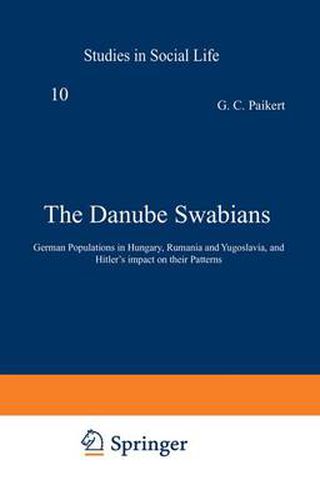Readings Newsletter
Become a Readings Member to make your shopping experience even easier.
Sign in or sign up for free!
You’re not far away from qualifying for FREE standard shipping within Australia
You’ve qualified for FREE standard shipping within Australia
The cart is loading…






Sedulo curavi humanas actiones non rid ere , non lugere, neque detestari, sed intelligere. SPINOZA This monograph is an attempt to present some information on the fabric and patterns of an ethnic minority group whose destiny was totally deflected by Hitler and his war. The people in question are the Danube Swabians, German populations who were so called because of their habitat in the middle Danube region of east-central and south-eastern Europe. Research for this study was done in 1964 in Hungary, Yugoslavia, Austria and the Federal Republic of Germany, in which countries the author contacted persons of competence and made use of archives and other sources. He also attended the annual con vention of the Danube Swabians in July, 1964 in VIm, Germany. In fact, he himself had a small part in the events which he at tempts to analyze here. From 1934 until 1944 he served in the Hungarian Ministry of Education in Budapest and headed for some years the department for the schooling of national minorities and also the department in charge of Hungary’s cultural inter change. He resigned from the former post in 1939, and was ousted from the second when German troops occupied Hungary in March, 1944. His personal recollections relating to the events during and after his tenure (he left Hungary for England in June, 1946) have been used to some extent in this study, especial ly in Chapter X.
$9.00 standard shipping within Australia
FREE standard shipping within Australia for orders over $100.00
Express & International shipping calculated at checkout
Sedulo curavi humanas actiones non rid ere , non lugere, neque detestari, sed intelligere. SPINOZA This monograph is an attempt to present some information on the fabric and patterns of an ethnic minority group whose destiny was totally deflected by Hitler and his war. The people in question are the Danube Swabians, German populations who were so called because of their habitat in the middle Danube region of east-central and south-eastern Europe. Research for this study was done in 1964 in Hungary, Yugoslavia, Austria and the Federal Republic of Germany, in which countries the author contacted persons of competence and made use of archives and other sources. He also attended the annual con vention of the Danube Swabians in July, 1964 in VIm, Germany. In fact, he himself had a small part in the events which he at tempts to analyze here. From 1934 until 1944 he served in the Hungarian Ministry of Education in Budapest and headed for some years the department for the schooling of national minorities and also the department in charge of Hungary’s cultural inter change. He resigned from the former post in 1939, and was ousted from the second when German troops occupied Hungary in March, 1944. His personal recollections relating to the events during and after his tenure (he left Hungary for England in June, 1946) have been used to some extent in this study, especial ly in Chapter X.